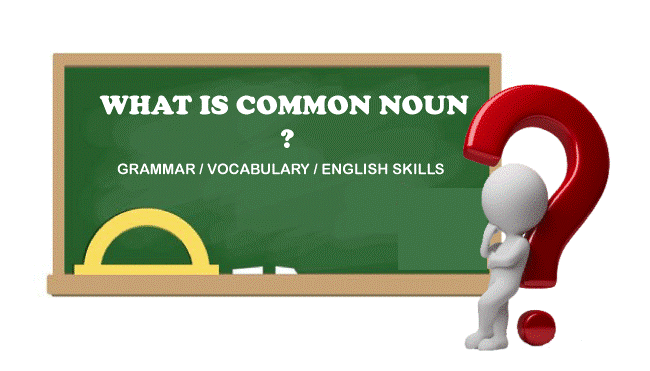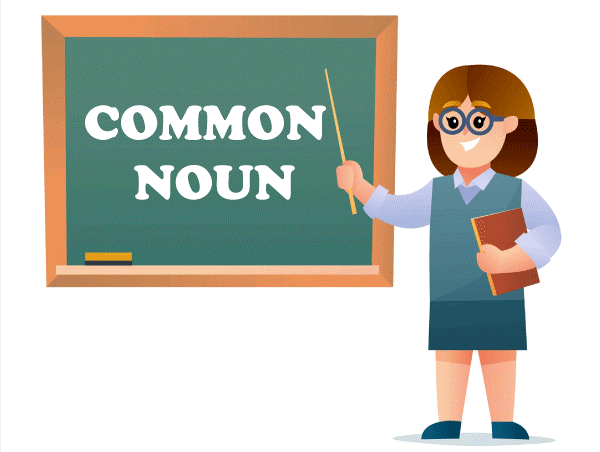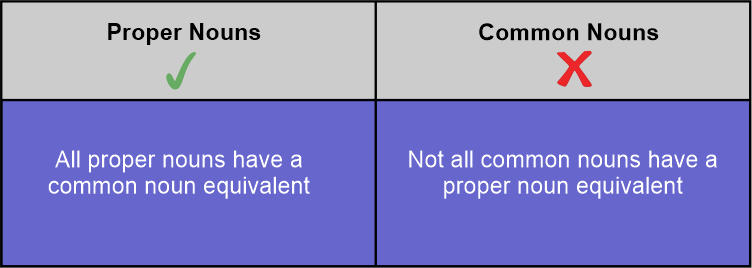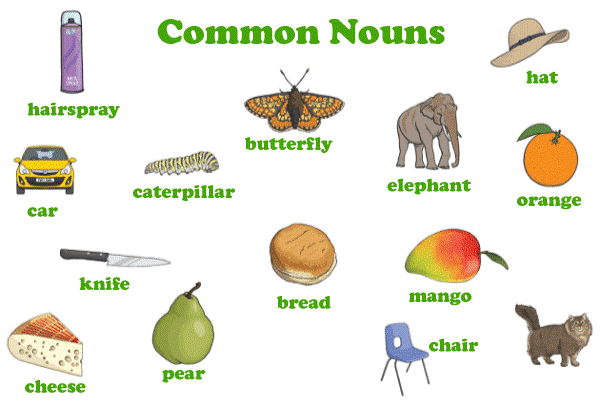Common Noun DefinitionIntroductionYou may have heard of proper nouns and common nouns before. This article on common nouns will assist you in comprehending what a common noun is, how they differ from proper nouns, and how to use them in phrases. For a thorough understanding of common nouns, look into the following topics on what a Common Noun is. Common nouns and proper nouns are the two main groups of nouns, and common nouns are terms used to name common people. 
Definition of Common NounA common noun is "a noun that may occur with limiting modifiers (such as an, some, every, and my) and that indicates any one of a class of beings or things" in the Merriam-Webster dictionary. A common noun is described as "a noun that is the name of a group of related items, such as "table" or "book," and not of a particular person, place, or thing" by the Cambridge Dictionary. A common noun is a noun that names an idea or denotes a certain kind of person, thing, or location. Contrary to proper nouns, usually capitalized, common nouns are capitalized only if they are the first words of a sentence. Here are some examples of using regular nouns in sentences:
Proper Nouns Versus Common NounsWhat is a Common Noun?Common nouns are generic and typically refer to groups of objects, persons, and locations rather than particular ones. They are often not modified by articles, determiners, or adjectives and are always capitalized. 
Examples of Nouns (both common and proper)
We can form Proper nouns from common nouns. Common nouns frequently acquire the proper form, characterized by capitalization when used as a name or a component of a name. For instance, terms describing familial duties, such as "dad," are frequently used. However, they become proper and capitalized when used as a name, without any articles or other determiners. Examples: Capitalizing responsibilities within the Family
The same is true for nouns that serve as titles, such as "president," "archbishop," and "professor," which are capitalized only when they appear as part of a person's name who holds that position. Examples include capitalizing titles and jobs. Here are the examples:
Most of the time, the four cardinal directions, north, east, south, and west, are common nouns. However, they are acceptable when they are used in the name of a particular place or with a cultural or political connotation. Examples include capitalizing the cardinal points. Here are the examples:
Note: In literary contexts, common nouns that denote significant concepts are occasionally capitalized to emphasize their significance (e.g., "Nature," "Truth"). On the other hand, proper nouns can sometimes lose their meaning and take on that of common nouns. For instance, "thermos," which was once capitalized because it was a brand name, is now more commonly used to refer to any vacuum flask. The majority of academic topics are nouns.One typical error is capitalizing words like concepts, theories, models, and frameworks as proper nouns. Although they may contain proper nouns (or appropriate adjectives), which we should capitalize, they are often common nouns. Concepts, theories, models, and frameworks are some examples, and it's frequently mistaken for psychiatry. Here are the examples:
Note: Some phrases with a similar meaning are typically capitalized (e.g., "Romanticism," "Type II mistake"). This is merely a general recommendation and not a rule. Check how it's done in other published papers from your profession if you need help determining whether to capitalize a certain term.What Distinguishes Common Nouns from Proper Nouns?
A common noun is a generic means of categorizing something, and a proper noun is a precise way of classifying something according to the distinction between the two basic noun types, proper and common. Dog, for instance, is a common noun; however, if your dog's name is Fido, then Fido is a proper noun.
Additional Illustrations of How Common and Proper Nouns Differ
You may have noted from the examples that proper nouns are typically capitalized, whereas common nouns generally are not unless they open a phrase. Additionally, both categories of nouns can contain several words. When Do We Use Common Nouns?Common nouns are used to describe an idea or a collection of objects. Consider the word "star," which describes the sky's stars. Star is a common term that refers to the category of objects that we see in the night sky, namely the luminescent bodies dispersed throughout the cosmos and twinkling overhead. The Sun is a noun that refers to the precise star occupying the central position in our solar system. People are typically named using common nouns, even though their given names or official titles may occasionally be proper nouns. Consequently, a common noun is frequently described as something that is a thing among the professions: lawyer, doctor, teacher, nurse, politician, and football player. 
Common nouns like teacher, clerk, police officer, preacher, delivery driver, boyfriend, girlfriend, granny, cousin, and barista are used to refer to people. For instance, mother is a frequent term for your mother.
However, the mother is a proper noun when referring to your mother or calling her by that name.
Common nouns can also refer to more abstract ideas, feelings, or experiences rather than actual objects. For instance, Abstract concepts include empathy, anger, time, democracy, hate, and laughter. How Can I Tell if a Word is Common Noun?Given what we have described previously, identifying a common noun should be rather simple. But there are a few situations where it can be difficult. Look at these words and phrases
In the first sentence, proper nouns are used for Queen Elizabeth II, President Trump, and Buckingham Palace. They are specific designations for a particular person. President and "queens and palaces" refer to the job title rather than a particular person. 
As we previously discussed, common nouns include terms like "attorney," "actor," "comedian," "truck driver," "sergeant," "officer," and "secretary." However, these can occasionally change into proper nouns, like in the cases above, if they are used as unique titles for a particular individual. Typically, this means that the words are capitalized when placed immediately before that person's name. William Barr, the attorney general, was chosen by the president. However, notice how we can use the same phrase with common nouns. While in office, each US president is required to nominate an attorney general. As a result, the common Noun can be identified because it is not capitalized. But remember that because common nouns refer to general categories or things, they can also be distinguished. The lesson here is that common nouns are generic names, and unless they're used to start a sentence or part of a title like "Postmaster General," they're not considered proper nouns. Lower Case is used when writing common nouns. We are accustomed to writing words in capital letters, as Noun prescribes when identifying them. However, the first letter of a proper noun was usually written in capital letters. However, we used to write it in the reduced Case for common nouns in general. Because common nouns are employed to describe relatively common, closely related, easily accessible natural phenomena, as suggested by their definition. An Illustration:This pot's water is unfit for consumption
Water is the most vital component for the human body. Although water is a common noun in this context, since it begins a phrase, we must capitalize the initial letter of water. When are Common Nouns OK to Use?Common are used to describe a certain set of objects or a concept. This indicates that anything can be categorized as a common noun if it qualifies as a "thing" in the broadest meaning. Let's look at some instances of common nouns in use: 1. Jobs or ProfessionsThe title of any employment is regarded as a common noun while discussing it. As an illustration, consider a doctor, teacher, chemist, singer, chef, nurse, or lawyer.
2. PeoplePeople are commonly referred to as common nouns. This does not apply when they are addressed by name because names are proper nouns and must all be capitalized. Instead, when referring to individuals using a title, ordinary nouns are utilized. Family names like "father," "mother," "sister," etc., are all examples of common nouns.
There are some situations where common nouns like mother and Father are transformed into proper nouns, which further complicates matters. This occurs, for instance, when the word "mother" is employed as a name or a direct address to a person. The same is true for terms like "sister" and similar phrases.
3. ObjectsObjects are referred to using common nouns?for instance, pants, a car, a plate, a fence, a chair, etc.
Ideas and ConceptsCommon nouns can describe fewer tangible things like concepts, ideas, and emotions in addition to more tangible things like objects. Love, guilt, peace, kindness, hate, etc. are a few examples.
Next TopicHeart Definition
|
 For Videos Join Our Youtube Channel: Join Now
For Videos Join Our Youtube Channel: Join Now
Feedback
- Send your Feedback to [email protected]
Help Others, Please Share










